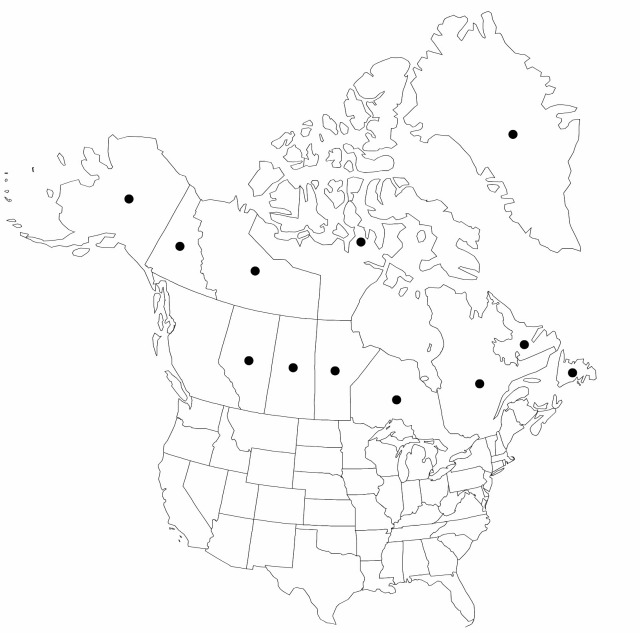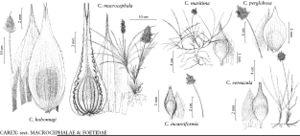Carex maritima
Fl. Norveg. 2: 131. 1772.
Plants colonial. Culms usually curved, bluntly trigonous, 1–25 (–44) cm smooth-angled distally. Leaves: basal sheaths brown to dark-brown; ligules 0.3–1.2 mm; blades involute, usually ± equaling culms, 0.5–2 mm wide. Inflorescences 0.5–1.6 (–2) cm; spikes ca. (1–) 3–7, essentially indistinguishable in dense ovoid to hemispheric head. Pistillate scales pale-brown to dark-brown, usually with broad whitish hyaline margins, broadly ovate to nearly orbicular, shorter than perigynia, apex obtuse to acute, body shiny, ± translucent. Anthers 1.1–2 mm. Perigynia pale yellowish-brown proximally, darker brown on beak and distally, essentially veinless to finely 3–12-veined abaxially, essentially veinless adaxially, ± inflated, ovate to broadly ovate, (3–) 3.2–5.1 × (1.4–) 1.6–2.3 (–2.7) mm, papery or leathery, dull to satiny; stipe 0.2–0.7 mm; beak 0.5–1 mm, scabrous-margined or, occasionally, smooth.
Phenology: Fruiting Jun–Aug.
Habitat: Beaches, dunes, fresh alluvium, rocky or mineral-rich soils of lake, river, and ocean shores, seepy slopes, fens, rock barrens, mostly near the coasts
Elevation: 0–900 m
Distribution

Greenland, Alta., Man., Nfld. and Labr., N.W.T., Nunavut, Ont., Que., Sask., Yukon, Alaska, South America, Eurasia
Discussion
The inland collections of Carex maritima from Manitoba and Alberta are introductions.
Carex maritima is an extremely widespread and variable species. On exposed headlands, plants can be very tiny in contrast to robust individuals on richer river shores or some inland lakeshores. Very small plants with extremely narrow leaves from coastal regions of Newfoundland have been named C. maritima var. setina, and unusually large plants from the shores of Kluane Lake, Yukon Territory, have been named C. maritima subsp. yukonensis. These are both regarded as environmentally derived, representing two extremes of the variation.
A few specimens from Greenland, Newfoundland, and Quebec appear to be hybrids between Carex maritima and Carex gynocrates (= C. ×langeana Fernald). Carex dutillyi O’Neill & Duman, described from Churchill, Manitoba, is probably also a hybrid of the same parentage.
Selected References
None.
Lower Taxa
"shortened" is not a number.
